
Editor’s note: Reprinted from the February 2021 issue of GCU Magazine. To read the digital version, click here.
By Lana Sweeten-Shults
GCU Magazine
It was a family – a girl in pigtails, a mom and a grandfather pushing a toddler in a stroller – that caught everyone’s eye.
Unlike others in line who weaved through the Empower College Prep parking lot in cars, this family walked to the charter school, just across Interstate 17 from Grand Canyon University.
They picked up one of the 40-pound boxes of food that GCU and Grand Canyon Education volunteers were unloading as part of the Farmers to Families Food Box Program distribution. The U.S. Department of Agriculture initiative connects struggling families to distributors and farmers who were dumping food being unused by school programs, restaurants and the like because of COVID-19 shutdowns.
Families like the one that walked to Empower were not deterred by the few thousand steps it would take to go that last mile to make sure their families would be OK.
Over two days in December, a time weighed down by COVID-19, employees and more than 100 student volunteers distributed approximately 2,100 boxes of food to more than 20 churches, social service organizations and schools, such as Empower.
GCU’s involvement in the initiative was the culmination of a conversation between Greg Harman, GCU Assistant Vice President of Academic Alliances, and CityServe International founder Dave Donaldson.
Harman happened to be sitting next to Donaldson at a meeting. Donaldson told him that CityServe – the organization tasked to mobilize the groups that would make the food distributions happen – wanted to partner with
a university that, like him, was determined to reinvigorate churches and others in the faith-based community in this purpose: to live out the Gospel of Jesus Christ and restore broken lives.
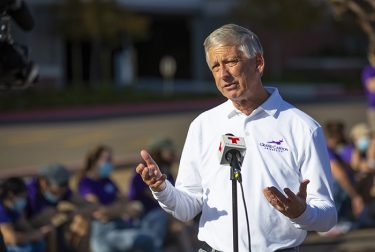
He found that like-mindedness in GCU, whose president, Brian Mueller, often speaks of the University’s Five-Point Plan and restoring the community, just as Donaldson often speaks of helping the community in that “last mile of need.”
“Every brick fit into place for this new partnership and renewed purpose – a momentum whose catalyst, ironically, was COVID.
“It was a God thing,” Harman said of how GCU was led down this new path. Mueller has expressed how the University has moved mountains in the past 12 years to transform the community.
“But it’s the tip of the iceberg; we need to keep moving,” he said, even if a global pandemic puts up barriers.
During COVID and times of great need, he emphasized being more outward in our faith: “Our response to that should be just a fanatical care for people who need help. The authenticity of our faith should, I think, be seen through our response to our salvation, which is to go out and help God’s people who are suffering, and so I think it’s important for us to just keep doing these things.”
Like Donaldson, GCU refused to let a global pandemic prevent it from serving its neighbors in west Phoenix, a community with a large number of essential workers, refugees and immigrants hit hard by COVID.
“To view COVID as a roadblock would require me to reduce God to a size smaller than the virus,” Donaldson said. “Fact is, God is not surprised by COVID, and it’s becoming one of the most catalytic tools to awaken the faith-based community to their mission and potential. Across our great land, there is a movement of kindness and compassion that is more potent and contagious than any virus, and I believe young people like those at GCU are the emerging leaders of this movement.
“In our bodies, when there is an infection, our white blood cells race to bring healing. I see the students at GCU as thousands of white blood cells equipped, resourced and mobilized to bring healing to the Phoenix area and to their home communities.”
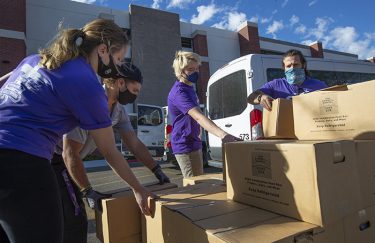
GCU’s new partnership with CityServe International is the most visible example of how the University has remained resolute in its mission to serve its neighbors. (The USDA Farmers to Families Food Box Program has distributed 132.8 million food boxes since it started in May.)
But it’s not the only way the University has moved mountains to help its neighbors during the pandemic.
When a campus shutdown was inevitable in March, the University hit pause on those community initiatives that are so much a part of GCU’s identity as a Christian institution, such as its work with Habitat for Humanity to renovate homes in the Canyon Corridor.
“With Habitat for Humanity, we knew we needed to suspend those projects, and we did so broken-hearted,” said Community Relations Director Debbie Accomazzo, who also knew that it was the right thing to do. But it didn’t take long for GCU and GCE to move beyond crisis mode: “The first opportunities really came for all of us with the PPE distribution,” Accomazzo said.
By April, the campus mobilized to make face masks and face shields – an effort that took the collaboration of numerous departments, from the College of Science, Engineering and Technology to Public Safety to Event Services to the College of Fine Arts and Production. Employees were all in, too, donating a little more than $59,000 to the initiative. With matching donations from GCU, GCE and corporate partners, more than $225,000 went toward the PPE effort.
The University donated 250 cloth masks to the Arizona State Veteran Home, 1,000 face shields each to the Maricopa County Department of Public Health and the Phoenix Indian Medical Center, and 340 face shields each to the city and Phoenix Children’s Hospital
Jaci Curran, Local Outreach Manager in the Office of Spiritual Life, said her department had to be innovative in how it continued to serve the community.
Before COVID, students would spend time with children in group homes but couldn’t do that during the pandemic, though they did donate presents. The Special Needs Ministry participated in drive-by Thanksgiving and Christmas parades, and students have become pen pals with neighborhood youth and with senior residents at nearby Colter Commons.
“We’re doing a lot to try to maintain our relationships with individuals in the community as best we can,” said Curran, whose office collaborated with other campus departments even more during COVID to come up with new ways to reach out to the community.
Though it could not deploy student and staff volunteers, the University continued to support Habitat for Humanity by funding home repairs in the Canyon Corridor through the employee giving program Allocate to Elevate.
The Learning Lounge, which provides free tutoring to K-12 students in the neighborhood, continued to provide academic support virtually and extended that support to Big Brothers Big Sisters. GCU also partnered with the city for Phoenix Food Day by producing a virtual food demonstration video.
GCU and GCE renewed their support of St. Mary’s Food Bank in their Give with Purpose employee holiday giving campaign in a year that was exceptionally difficult for food banks across the nation. When the pandemic reached Arizona in the spring, the number of food bank clients doubled and, at one point, tripled, at a time when 80% of its volunteer force disappeared.
Recognizing those challenges, employees exceeded 2019’s fundraising goal for St. Mary’s.
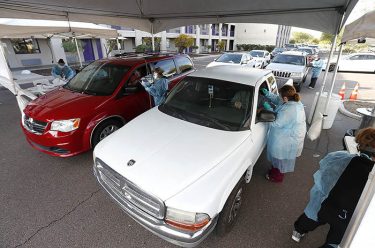
Another major opportunity to reinvest in its relationships with the community came when GCU twice became a host site for free COVID testing organized by the R.A.P.I.D. Community-based COVID-19 Response Coalition. The new group formed during the pandemic to make sure underserved and under-represented populations, such as those in the nearby Maryvale community, had access to testing – and to vaccines when the time comes.
“That actually is history being made in Arizona,” Accomazzo said of the coalition, made up of organizations such as Chicanos por la Causa, Equality Health and other medical and governmental groups.
The University’s partnership with the coalition exemplified how GCU and GCE have deepened their relationships with the community.
“Chicanos por la Causa, for example. We maybe have worked with them off and on, here and there. But we’re now finding significant ways to work with them, and not just in one area, but multiple,” said Accomazzo, whose 2021 calendar includes an inaugural golf tournament with Chicanos por la Causa and GCU.
It was while meeting about that golf tournament that Cathy Keppel, Chicanos por la Causa Event Planner, heard from Accomazzo about Farmers to Families.
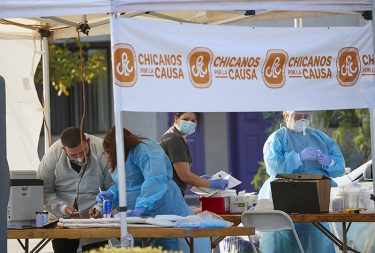
“If we ever have any items, we want to add you to our list of nonprofits that we want to work with,” Accomazzo told Keppel.
“That’s fabulous!” Keppel said.
When Keppel found out the first distribution was just a couple of days away, she immediately got on the phone and started calling Chicanos por la Causa’s different programs.
Two of its programs at that first distribution received 100 boxes of food.
The golf tournament, along with the food distribution and COVID testing, are just the beginning of that budding relationship with Chicanos por la Causa.
“I know that Chicanos por la Causa, my president, your president, have had a great relationship,” Keppel said, “and we’re building on it.”
Brian Holman, Executive Director of Empower College Prep, feels the same way about the school’s relationship with GCU strengthening during the pandemic.
Before COVID, the focus was on academics.
The University has placed practicum teachers at Empower, its staff members have taken education courses at GCU and some of its teachers are GCU alumni. But that relationship has expanded beyond academics.
“It’s definitely grown,” Holman said. “We enter routines and habits, and when those habits are disrupted, we all go into a little bit of survival mode. When you go into survival mode, you ask yourself, what’s most important?
“We have found, during this time, ensuring that the families we serve are healthy and stable and supported is of utmost importance, and we have found that other organizations in our community, like GCU, are essential in meeting those needs of our families.”
Accomazzo, too, has felt that wind of change in these new, more intentional relationships despite the isolation of a COVID world.
“It’s a more intimate relationship that we have with the community,” she said. “We’re all coming from the same place of vulnerability, and, because of that, we all have the same risks and many of the same things at stake. So I think we’re sharing that vulnerability in new ways.”
Even more important, she said: “We’re all seeking the same solution, so we’re all working in tandem in ways we never have before.”
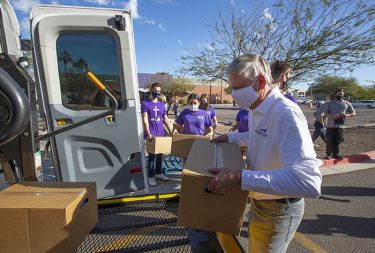
Count on the same in 2021 as GCU looks at becoming the first CityServe distribution site, or HUB, in Arizona. As such, it will distribute more Farmers to Families food boxes – $1.5 billion more has been allocated to the program so it can continue through April.
The University also will be a warehouse and distribution site for donations from businesses such as Costco, Home Depot and Amazon that will go to community groups called PODs, or points of distribution.
Mueller sees CityServe GCU as eventually connecting to 100 PODs.
“Hopefully what will happen, as we get to know these families as we deliver items that can help them, we’ll get to know them even deeper,” he said, and help them become self-sufficient and sustainable.
“When we work together as an entire Christian community, we can accomplish so much more.”
Moving mountains in that last mile of need, especially during COVID.
GCU senior writer Lana Sweeten-Shults can be reached at [email protected] or at 602-639-7901.
***
Related content:
GCU Today: GCU-CityServe partnership delivers to those in need
GCU Today: Food box distribution a bright light for GCU partners
GCU Today: GCU takes national stage at CityServe celebration



































































